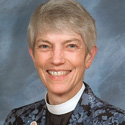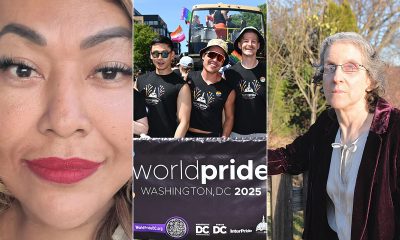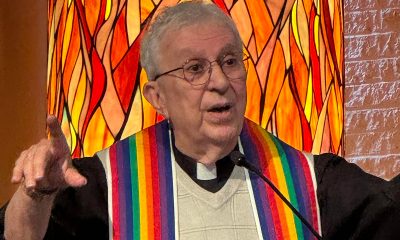National
World news in brief
Anglicans cut Episcopalians from ecumenical bodies & more

Anglicans cut Episcopalians from ecumenical bodies
LONDON — The Anglican Communion has suspended U.S. Episcopalians from serving on ecumenical bodies because of the election of a lesbian as a bishop in California.
The Associated Press reported that the U.S. church opened a rift in the global communion, and within its own ranks, seven years ago by electing a gay man, V. Gene Robinson, as bishop of New Hampshire. Conservative African Anglicans have taken a lead in opposing moves in the United States and Canada to promote gays and to bless same-sex relationships.
Rowan Williams, the archbishop of Canterbury and spiritual leader of the Anglican Communion, had called for a moratorium on appointing gays to leadership positions. He asked for action against the Episcopal Church after the Rev. Canon Mary Glasspool was made an assistant bishop of Los Angeles.
The Anglican Communion is an association of 44 regional and national member churches, most founded by Church of England missionaries, with more than 80 million members in more than 160 countries.
According to the Associated Press, the Rev. Canon Kenneth Kearon, secretary general of the Anglican Communion, announced June 7 that Episcopalians had been downgraded from members to consultants in formal ecumenical dialogues, annual meetings between Anglicans and clergy in other churches intended to build friendship and better understand one another’s traditions and issues of mutual concern such as points of theology and ways of worshipping.
Kearon said he had also written to the primate of the Anglican Church of Canada to ask whether it has formally adopted a policy backing same-sex blessings, the Associated Press reported.
The Episcopal News Service said the Rev. Katherine Grieb, an Episcopal priest and professor of New Testament at Virginia Theological Seminary, was downgraded from member to consultant to the Inter Anglican Standing Commission on Unity Faith & Order.
Those who were stripped of membership in ecumenical dialogues, according to ENS, were the Rev. Thomas Ferguson and Assistant Bishop William Gregg of North Carolina, both involved in the Anglican-Orthodox Theological Dialogue; Bishop C. Franklin Brookhart of Montana had been a member of the Anglican-Methodist International Commission for Unity in Mission; and the Rev. William Petersen, professor of ecclesiastical and ecumenical history of Bexley Hall in Columbus, Ohio, who was serving on the Anglican-Lutheran International Commission.
Gay love exhibition opens in Warsaw museum
WARSAW, Poland — The director of Poland’s National Museum says an exhibition on gay and lesbian love is designed to provoke discussion on the place of homosexuals in this conservative and overwhelmingly Catholic country.
The head of the National Museum in Warsaw, Piotr Piotrowski, told the Associated Press in advance of the exhibition’s June 11 opening that the museum is already getting protests from various groups.
The exhibition runs through Sept. 5 and primarily features male nudes and same-sex couples depicted in ancient sculpture and contemporary painting and photography.
According to the Associated Press, Culture Minister Bogdan Zdrojewski last year spoke in defense of the exhibition after an opposition lawmaker protested the project.
Thousands celebrate Berlin’s gay pride parade
BERLIN — Tens of thousands of gays, lesbians and other revelers marched and danced in downtown Berlin last weekend for the German capital’s annual gay pride celebration, which features a colorful parade through the heart of the city.
Under the motto “Normal is different,” an estimated 250,000 people lined the route for the Christopher Street Day parade June 19, as some 50 floats carrying dancers wove through the city streets, the Associated Press reported.
Christopher Street Day commemorates the start of the gay rights movement in New York’s Greenwich Village in 1969 and the parade generally draws large crowds in Berlin, which has a history as a gay metropolis going back as far as the 19th century.

The Comings & Goings column is about sharing the professional successes of our community. We want to recognize those landing new jobs, new clients for their business, joining boards of organizations and other achievements. Please share your successes with us at [email protected].
Congratulations to Gil Pontes III on his recent appointment to the Financial Advisory Board for the City of Wilton Manors, Fla. Upon being appointed he said, “I’m honored to join the Financial Advisory Board for the City of Wilton Manors at such an important moment for our community. In my role as Executive Director of the NextGen Chamber of Commerce, I spend much of my time focused on economic growth, fiscal sustainability, and the long-term competitiveness of emerging business leaders. I look forward to bringing that perspective to Wilton Manors — helping ensure responsible stewardship of public resources while supporting a vibrant, inclusive local economy.”
Pontes is a nonprofit executive with years of development, operations, budget, management, and strategic planning experience in 501(c)(3), 501(c)(4), and political organizations. Pontes is currently executive director of NextGen, Chamber of Commerce. NextGen Chamber’s mission is to “empower emerging business leaders by generating insights, encouraging engagement, and nurturing leadership development to shape the future economy.” Prior to that he served as managing director of The Nora Project, and director of development also at The Nora Project. He has held a number of other positions including Major Gifts Officer, Thundermist Health Center, and has worked in both real estate and banking including as Business Solutions Adviser, Ironwood Financial. For three years he was a Selectman, Town of Berkley, Mass. In that role, he managed HR and general governance for town government. There were 200+ staff and 6,500 constituents. He balanced a $20,000,000 budget annually, established an Economic Development Committee, and hired the first town administrator.
Pontes earned his bachelor’s degree in political science from the University of Massachusetts, Dartmouth.
Kansas
ACLU sues Kansas over law invalidating trans residents’ IDs
A new Kansas bill requires transgender residents to have their driver’s licenses reflect their sex assigned at birth, invalidating current licenses.

Transgender people across Kansas received letters in the mail on Wednesday demanding the immediate surrender of their driver’s licenses following passage of one of the harshest transgender bathroom bans in the nation. Now the American Civil Liberties Union is filing a lawsuit to block the ban and protect transgender residents from what advocates describe as “sweeping” and “punitive” consequences.
Independent journalist Erin Reed broke the story Wednesday after lawmakers approved House Substitute for Senate Bill 244. In her reporting, Reed included a photo of the letter sent to transgender Kansans, requiring them to obtain a driver’s license that reflects their sex assigned at birth rather than the gender with which they identify.
According to the reporting, transgender Kansans must surrender their driver’s licenses and that their current credentials — regardless of expiration date — will be considered invalid upon the law’s publication. The move effectively nullifies previously issued identification documents, creating immediate uncertainty for those impacted.
House Substitute for Senate Bill 244 also stipulates that any transgender person caught driving without a valid license could face a class B misdemeanor, punishable by up to six months in jail and a $1,000 fine. That potential penalty adds a criminal dimension to what began as an administrative action. It also compounds the legal risks for transgender Kansans, as the state already requires county jails to house inmates according to sex assigned at birth — a policy that advocates say can place transgender detainees at heightened risk.
Beyond identification issues, SB 244 not only bans transgender people from using restrooms that match their gender identity in government buildings — including libraries, courthouses, state parks, hospitals, and interstate rest stops — with the possibility for criminal penalties, but also allows for what critics have described as a “bathroom bounty hunter” provision. The measure permits anyone who encounters a transgender person in a restroom — including potentially in private businesses — to sue them for large sums of money, dramatically expanding the scope of enforcement beyond government authorities.
The lawsuit challenging SB 244 was filed today in the District Court of Douglas County on behalf of anonymous plaintiffs Daniel Doe and Matthew Moe by the American Civil Liberties Union, the ACLU of Kansas, and Ballard Spahr LLP. The complaint argues that SB 244 violates the Kansas Constitution’s protections for personal autonomy, privacy, equality under the law, due process, and freedom of speech.
Additionally, the American Civil Liberties Union filed a temporary restraining order on behalf of the anonymous plaintiffs, arguing that the order — followed by a temporary injunction — is necessary to prevent the “irreparable harm” that would result from SB 244.
State Rep. Abi Boatman, a Wichita Democrat and the only transgender member of the Kansas Legislature, told the Kansas City Star on Wednesday that “persecution is the point.”
“This legislation is a direct attack on the dignity and humanity of transgender Kansans,” said Monica Bennett, legal director of the ACLU of Kansas. “It undermines our state’s strong constitutional protections against government overreach and persecution.”
“SB 244 is a cruel and craven threat to public safety all in the name of fostering fear, division, and paranoia,” said Harper Seldin, senior staff attorney for the ACLU’s LGBTQ & HIV Rights Project. “The invalidation of state-issued IDs threatens to out transgender people against their will every time they apply for a job, rent an apartment, or interact with police. Taken as a whole, SB 244 is a transparent attempt to deny transgender people autonomy over their own identities and push them out of public life altogether.”
“SB 244 presents a state-sanctioned attack on transgender people aimed at silencing, dehumanizing, and alienating Kansans whose gender identity does not conform to the state legislature’s preferences,” said Heather St. Clair, a Ballard Spahr litigator working on the case. “Ballard Spahr is committed to standing with the ACLU and the plaintiffs in fighting on behalf of transgender Kansans for a remedy against the injustices presented by SB 244, and is dedicated to protecting the constitutional rights jeopardized by this new law.”
National
After layoffs at Advocate, parent company acquires ‘Them’ from Conde Nast
Top editorial staff let go last week

Former staff members at the Advocate and Out magazines revealed that parent company Equalpride laid off a number of employees late last week.
Those let go included Advocate editor-in-chief Alex Cooper, Pride.com editor-in-chief Rachel Shatto, brand partnerships manager Erin Manley, community editor Marie-Adélina de la Ferriére, and Out magazine staff writers Moises Mendez and Bernardo Sim, according to a report in Hollywood Reporter.
Cooper, who joined the company in 2021, posted to social media that, “Few people have had the privilege of leading this legendary LGBTQ+ news outlet, and I’m deeply honored to have been one of them. To my team: thank you for the last four years. You’ve been the best. For those also affected today, please let me know how I can support you.”
The Advocate’s PR firm when reached by the Blade said it no longer represents the company. Emails to the Advocate went unanswered.
Equalpride on Friday announced it acquired “Them,” a digital LGBTQ outlet founded in 2017 by Conde Nast.
“Equalpride exists to elevate, celebrate and protect LGBTQ+ storytelling at scale,” Equalpride CEO Mark Berryhill said according to Hollywood Reporter. “By combining the strengths of our brands with this respected digital platform, we’re creating a unified ecosystem that delivers even more impact for our audiences, advertisers, and community partners.”
It’s not clear if “Them” staff would take over editorial responsibilities for the Advocate and Out.




















